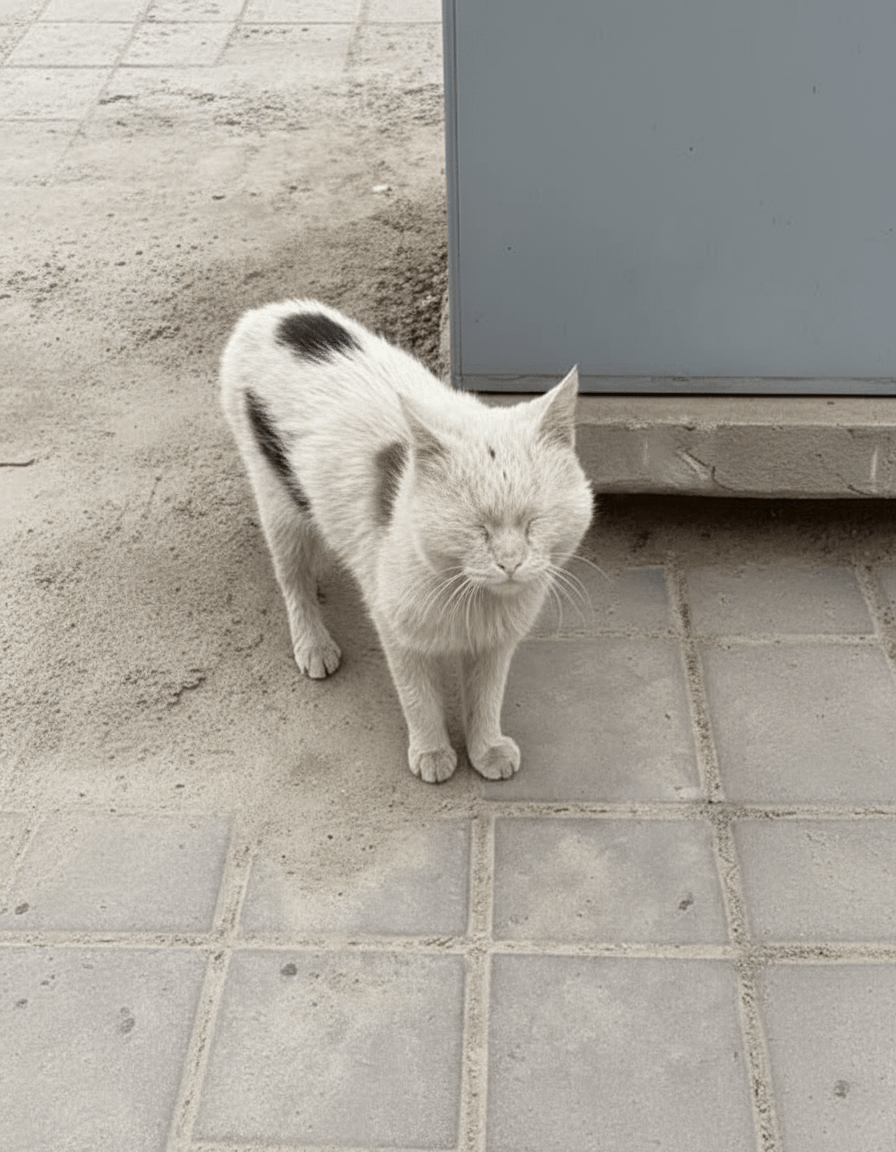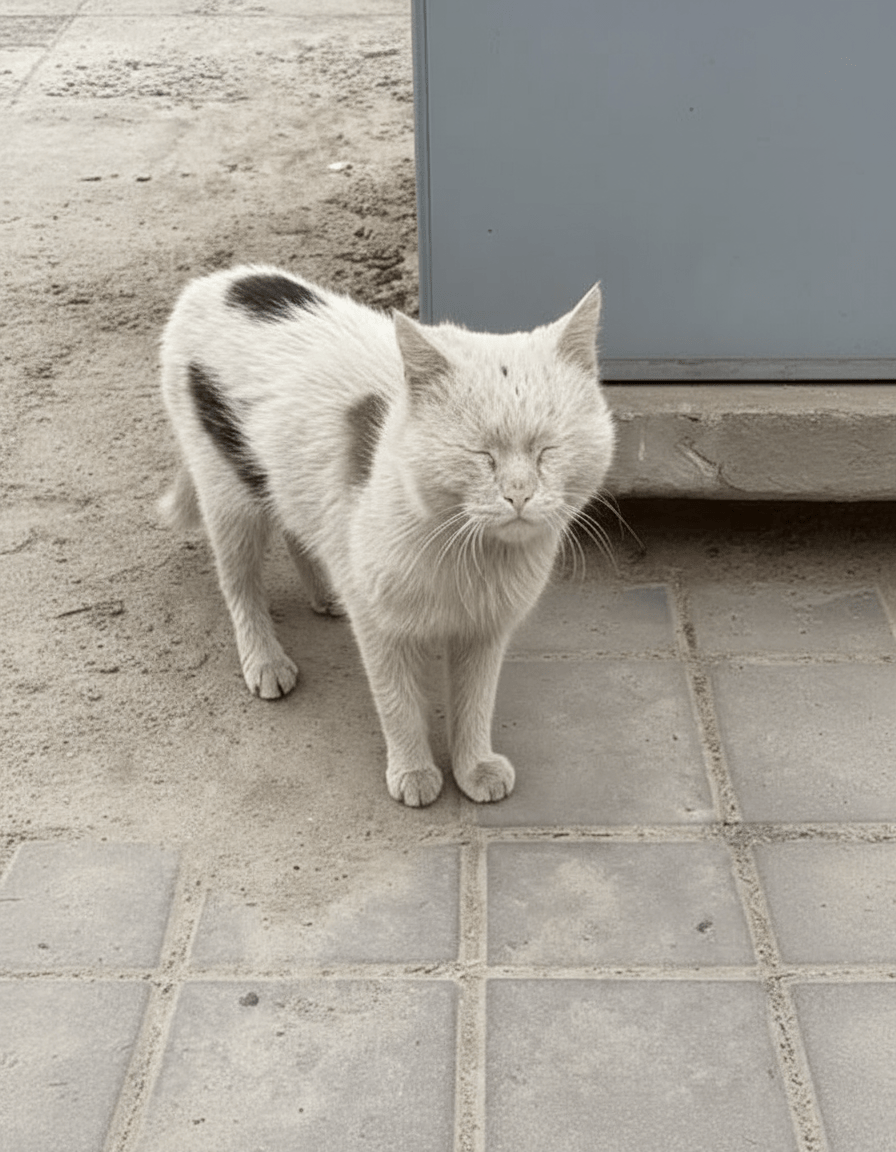In the dusty backstreets of a sun-bleached neighborhood in Marrakech, Morocco, a frail white cat with black patches wandered aimlessly, his milky eyes reflecting a lifetime of hardship yet still searching for kindness. It was late October 2023, and the air carried the scent of tagine spices mingling with the dry earth. Local shopkeepers had noticed him for weeks—squinting against the harsh light, bumping into crates of oranges, and curling up beneath a rusted metal door that once belonged to a modest family home. They called him “El Blanco” out of pity, tossing him scraps of bread or fish heads when they could. No one knew his real story until a chance encounter unraveled a tale that spanned continents, revealing how one elderly, blind feline had been loved, lost, and ultimately rediscovered in the most unexpected ways. This is the true account of Oliver—once abandoned, now cherished—whose journey from rejection to redemption has touched hearts in cities far beyond Morocco’s borders, proving that age and infirmity cannot dim a soul’s capacity for affection.

The cat’s odyssey began not in Marrakech, but nearly a decade earlier in a quiet suburb of Lisbon, Portugal. Born in 2013 to a litter of street cats near the Tagus River, he was adopted as a kitten by a young couple, Sofia and Miguel Almeida, who named him “Luz” for the light he brought into their modest apartment. Luz was playful and affectionate, with striking black markings on his head and tail that resembled a painter’s bold strokes on a white canvas. The Almeidas doted on him—vet visits, premium kibble, even a custom scratching post made from reclaimed cork. But life shifted unexpectedly in 2018 when Miguel’s job transferred the family to Dubai, United Arab Emirates. Crating Luz for the long flight, they promised him a new life amid skyscrapers and air-conditioned luxury. For a while, it worked; Luz adapted to rooftop views and indoor playtime, his eyes still sharp and curious.
Tragedy struck in early 2020, just as the world grappled with the emerging COVID-19 pandemic. Sofia, pregnant with their first child, developed severe allergies triggered by the move’s stress and desert dust. Veterinarians in Dubai confirmed Luz’s dander was exacerbating her condition, and with a baby on the way, tough decisions loomed. Heartbroken, the Almeidas rehomed him with an expatriate colleague, an Australian engineer named Liam Harper, who was relocating to Marrakech for a solar energy project. Liam, an animal lover with two dogs back home, assured them Luz would thrive in his spacious riad. Papers were signed, microchip updated, and Luz—now renamed “Patch” for simplicity—boarded another flight in a carrier lined with his favorite blanket.
Marrakech’s medina was a sensory overload for Patch: the cacophony of souk vendors, the aroma of mint tea, the scramble of feral cats competing for scraps. Liam cared for him diligently at first, installing a catio on the rooftop for safe sunbathing. But in 2022, an unexpected detail emerged that would alter everything—Patch began losing his vision. It started subtly: hesitation at stairs, missed jumps onto furniture. A local vet diagnosed progressive retinal atrophy, a genetic condition common in certain lineages, accelerated perhaps by the stress of multiple relocations and intense sunlight exposure. By mid-2023, Patch was completely blind, navigating by whisker touch and memory alone. Liam, facing project deadlines and his own family’s return to Australia, felt overwhelmed. In a moment of quiet desperation, he left Patch near the familiar rusted door of a nearby bakery, believing the shopkeepers’ kindness would sustain him. A note tucked into his collar read: “Please care for Patch. He is old and blind but loving.”
Word of the abandoned cat spread quickly through Marrakech’s expat WhatsApp groups and local animal rescue networks. Enter Elena Vasquez, a 34-year-old travel writer from Barcelona, Spain, who had been living in Morocco for six months researching a book on North African street animals. Elena first spotted him on a sweltering afternoon while sipping coffee at a café overlooking the alley. His squinting face, captured in a quick smartphone photo, went viral on her Instagram story with the caption: “This senior gent needs a hero.” Responses flooded in from around the world—offers of adoption from Canada, tips from U.K. vets on blind cat care, even a donation from a Japanese fan for specialized toys.
What happened next was pure serendipity. Among the thousands of shares, a message arrived from Sofia Almeida, now back in Lisbon with her toddler. She recognized the black patches immediately—her Luz! Through Elena’s posts, Sofia learned of the Dubai rehoming, Liam’s departure, and the bakery doorstep. Devastated, she contacted Elena via video call, tears streaming as she explained the allergies and the impossible choice. “We never stopped loving him,” Sofia said. “But he’s 10 now, blind… our life is different. We can’t take him back.” It was a gut-wrenching reunion-by-proxy, with Elena holding the phone so Sofia could “see” her former pet meow faintly in recognition of her voice.

Refusing to let the story end in sorrow, Elena decided to adopt him herself. She renamed him Oliver, after her late grandfather who had taught her compassion for the vulnerable. The transition wasn’t seamless—unexpected challenges arose. Oliver, disoriented in Elena’s rented apartment, initially hid under a bed for days, emerging only for food. She consulted blind cat experts online, learning from forums in the United States about tactile pathways: textured rugs leading to litter boxes, scent markers with vanilla extract, and wind chimes for auditory cues. A surprise vet visit in Casablanca revealed Oliver had early kidney issues, common in senior cats, requiring a special diet imported from France. Costs mounted, but a GoFundMe campaign launched by Elena’s followers—spanning donors in Germany, Brazil, and South Korea—raised over €5,000 in a week.
Oliver’s personality blossomed in ways no one anticipated. Despite his blindness, he developed an uncanny knack for “mapping” rooms, racing confidently along walls with tail held high. He adored classical music—purring loudest to Vivaldi—and formed an unlikely bond with Elena’s rescue parrot, a green-cheeked conure named Paco, who would perch on Oliver’s back during naps. Visitors from Elena’s global network trickled in: a photographer from Iceland captured his serene expressions in a series titled “Eyes of the Soul,” exhibited in Reykjavik; a children’s author from New Zealand wrote a picture book inspired by his story, proceeds funding spay-neuter programs in Thailand.
By spring 2024, Oliver’s tale had circled the globe through media outlets. CNN International featured a segment on pet relocation risks, using his journey as a cautionary yet hopeful example. Animal welfare organizations in Australia launched “Senior Pet Second Chance” initiatives, while in Mexico City, murals of a white cat with closed eyes appeared on shelter walls. Elena documented it all on a blog, “Oliver’s World Without Sight,” amassing 100,000 followers who shared their own stories of aging pets.
Today, in Elena’s sunlit Marrakech home, Oliver thrives at age 12. He has a heated blanket for cool desert nights, daily gentle massages to ease arthritic joints, and a window perch where breezes carry familiar souk scents. His eyes, though unseeing, convey endless gratitude—pupils dilating at Elena’s voice, head butting her hand for affection. The Almeidas send annual care packages from Portugal: toys infused with catnip grown in their garden, a tradition bridging old and new families.
Oliver’s story underscores a universal truth: animals, especially seniors, adapt with remarkable resilience when given love without conditions. From Lisbon’s riverside beginnings to Dubai’s towers, Marrakech’s alleys, and beyond, his path illustrates how global connectivity can turn abandonment into advocacy. In an era of disposable pets, Oliver reminds us that every wrinkled face, every cloudy eye, holds a lifetime of loyalty waiting to be cherished. He is no longer “too old” or “not the same”—he is perfectly, profoundly Oliver, proof that second chances know no borders.






